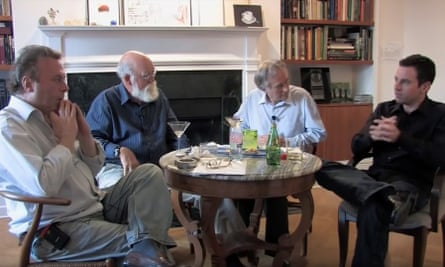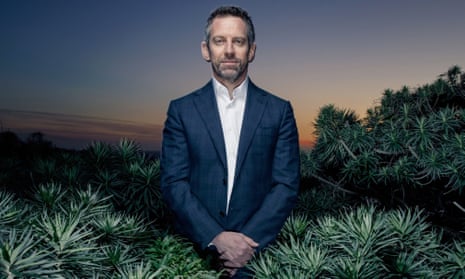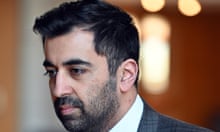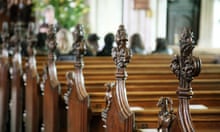Back in the middle of the first decade of this century, a new movement was heralded by the publication of several books on the same subject. The main four authors were Richard Dawkins, Christopher Hitchens, Daniel Dennett and Sam Harris. And the movement was called the New Atheism.
At the time, Harris, who was actually the first to publish, with his book The End of Faith, was unquestionably the junior partner. The others had global reputations in their fields – Dawkins in evolutionary biology, Hitchens in journalism and public speaking, and Dennett in philosophy and cognitive science. All Harris had was his book and a BA in philosophy. The four, who would become known as the Four Horsemen, got together in 2007 at Hitchens’s apartment in Washington to discuss arguments for atheism or, more accurately, against faith. The event was recorded and is available to watch on Youtube.
By some way the youngest, Harris looks a little as if Ben Stiller, whom he physically resembles, had joined a meeting of great minds and made a good fist of being serious. He could easily have been the Ringo Starr of the quartet, but he more than holds his own.
Now that conversation has been published in a book entitled The Four Horsemen, with a glowing foreword by Stephen Fry. It’s an odd moment in history to revisit. The New Atheism has rather faded from prominence, partly because, as its proponents acknowledged, it was not very different from the old atheism. And partly because it was a product of the ‘war on terror’, or at least an intellectual response to what that war was ostensibly targeting: namely, radical Islam.
Today, Dawkins and Dennett are in their late 70s, and no longer quite as active, and Hitchens, the most charismatic of them all, is dead. That leaves Harris to uphold the cause, which he has done with great energy. Today he is one of the best-known public intellectuals in America, thanks to a series of bestsellers, his podcast, and a celebrated altercation with the Hollywood actor Ben Affleck, of which more later.
But first, on the phone to Los Angeles, I ask Harris how well he knew his fellow Horsemen.
“I think I met Hitch in 2007, when God Is Not Great was just about to launch,” he recalls. “I hadn’t seen him in person very many times. I knew Richard and Dan longer than that – mostly an email relationship. As I say in my introduction to the book [The Four Horsemen], I was surprised that that was in fact the only conversation the four of us had ever had.”
Its uniqueness is a selling point of the book, which is subtitled: The Discussion that Sparked an Atheist Revolution. That may be a little hyperbolic, but it’s true that the gathering has gained a certain historical significance, not to mention mythology. The four men – or should we, in the era of identity politics, say the four white, heterosexual men – have become heroes, less to an atheist movement than to an outspokenly rationalist one.
There is a growing divide between those who trumpet empirical evidence and those who question the cultural and social conditions to which empiricism remains blind. Harris is very definitely located at the forefront of the former group, and is widely loathed by those who are in the latter – a designation that would include many on the postmodern left. On internet chatrooms and in online debates, he is a ubiquitous reference point, a lightning conductor in many contemporary social and intellectual disagreements. He is often referred to as a racist, an Islamophobe and a prime example of white entitlement. He contests all the accusations, but they haven’t gone away.
Perhaps the moment that Harris became identified in the wider American public’s eye as a contentious figure was his run-in four years ago with Affleck on the satirical TV show Real Time With Bill Maher. During a debate on Islam, the Hollywood star accused Harris of Islamophobia and racism. The powerfully built Affleck was full of righteous passion and, although Harris remained calm and tried to get his point across, the smaller man appeared intimidated by the actor’s physical and celebrity presence. Harris says it wasn’t until they were walking off stage that he really found his voice.
“I said: ‘You know that if we decided to burn a Bible on live television tonight it would be controversial, but it wouldn’t ruin our lives. If we decided to burn a Qur’an on the show tonight, the rest of our lives would be spent dealing with the aftermath, and you know that and you’re lying about it.’”
It was a very Harris-like observation: a telling comparison, a vivid image and a stark moral challenge. These are his stock in trade methods, the kind of debating points that rally his fans and enrage his enemies.
Harris was something of a frustrated writer and a failed novelist when he found his subject. The terrorist attacks of 9/11 turned him into a nonfiction writer overnight.
“The End of Faith was a direct response to those events,” he says. “I literally began writing it on 9/12 or 9/13. The moment it became clear what had happened, it was clear that I needed to write that book.”
He had not long before completed a philosophy degree at Stanford University, having taken an 11-year break from an English degree he had been doing. In that earlier university stint he had experimented with MDMA, which led to an interest in meditation, studying in India and Nepal and two years on silent retreat in one-week to three-month increments. His life in those days sounds like something from a Herman Hesse novel – lots of reading philosophy, contemplation, and nothing so dull as a day job. Throughout his long educational and professional lacuna, he was supported by his parents, the actor Berkeley Harris and the TV producer Susan Harris, who created The Golden Girls (his parents divorced when he was two).
“It was a blessing and a curse,” he says of their financial backing, because while he was able to read, write and do what he wanted, he neglected to build a career in writing.
The End of Faith changed all that. Its core thesis was quite simple. Ideologies or belief systems, Harris argued, inform actions. You can look at social, ethnic, class and cultural backgrounds of the people who, for example, commit suicide bombings and no unifying pattern will emerge. But what they overwhelming share is a belief system or, more specifically, a faith. It’s an argument he has made many times, and most particularly directed towards the faith of Islam. He repeats it again to me.
“There’s only one religion on Earth that poses this problem to civil society. The Mormons don’t do this. The fundamentalist Christians don’t do this. I mean, they do it in places like Uganda, but they don’t do it in many places, even in a developing world.”
Statistically speaking, Harris is on strong ground, though there are many other factors that could be taken into account. But it’s when he strays from strict definitions to general assertions that he gets into trouble, and that has led to the accusations of Islamophobia. He rejects the term, drawing a distinction between attacking Islam, a set of codified beliefs, and demonising Muslims, an enormous and varied group of people.
I quote him something he wrote in the wake of the Danish cartoons crisis back in 2006:
“Throughout western Europe, Muslim immigrants show little inclination to acquire the secular and civil values of their host countries, and yet exploit these values to the utmost – demanding tolerance for their backwardness, their misogyny, their antisemitism, and the genocidal hatred that is regularly preached in their mosques.”
Although it was an emotional time, that sounds more like he’s damning Muslims in total rather than Islam itself. “It was an emotional time,” he replies, “and that [passage] has a fair amount of topspin and it’s not caveated at all, but it is, nonetheless, descriptively true.”

In The Four Horsemen, the incompatibility of Islam and secular humanist values comes up in one of the few moments of group dispute. The discussion turns to the issue of comparative religious malevolence. Dawkins characterises this as “whether Islam is worse than Christianity”. Hitchens takes the view that all religions are “latently” equally dangerous. But Harris rejects this pussyfooting egalitarianism.
“The mayhem that’s going on under the aegis of Islam just cannot be compared to the fact that we have two people a decade who kill abortionists,” he tells the other three.
That a great deal of the mayhem then going on was in Iraq, which had just been devastated by the US-led invasion, is left aside. There is an air of bristling doom that hangs over the original discussion and can still be detected in the book. It’s as if the participants, rather like their religious foes, expect a great catastrophic showdown between the secular and religious worlds.
At the end, there’s a rather bleak moment, when Harris asks what their hopes and fears are for the future, and what can be achieved in their children’s lifetimes. Hitchens says that while they may be winning the argument intellectually, in global terms he and his fellow secularists are in “a tiny, dwindling minority that’s going to be defeated by the forces of theocracy”. The true defenders of secularism, proclaims Hitchens, are the 82nd Airborne infantry division.
Does Harris share that militaristic appraisal?
“I think it’s a problem that we can lose sight of for months or even years at a time,” he says. “But it’s going to erupt at some point. It’s hard to see how this violence is ever going to resolve itself without a fundamental reformation in the Muslim community. That’s hard to imagine at the moment.”
After that meeting of the Horsemen, Harris went on to complete a PhD in cognitive neuroscience. He has since written about consciousness from a materialist, scientific perspective, making the case that what we think of as free will is an illusion. But he has also explored it from what, for want of a better phrase, can only be described as a spiritual outlook. As a longtime exponent of meditation, as well as a practitioner of the martial art of Brazilian jiu-jitsu, Harris has a side to his character that, by comparison with his three collaborators, makes him look less like a New Atheist than some Californian New Ager. In the discussion he tells them that there is “a place for the sacred in our lives”, and Dawkins looks askance, as if Harris were about to get out a prayer mat.
Yet for such a combative rationalist, he remains incongruously keen on what the besandalled used to call self-transcendence. One of his more recent books was entitled Waking Up: Searching for Spirituality Without Religion. Harris sees no contradiction between his objective studies of the mind and the subjective experience of escaping its perpetual noise. They’re both means of understanding consciousness, he says.
“That we’re here and experiencing the world at each moment in the light of our consciousness is a deeply mysterious and profound fact, which, the more you pay attention to it, the more your experience begins to echo some of the claims of religious patriarchs and matriarchs down the ages.”
He says the west could learn a lot from the east – not Islam, but the traditions of meditation found in Hinduism and Buddhism.
“We are sleepwalking, and when you learn how to meditate, you recognise that there is another possibility, which is to be vividly aware of your experience in each moment in a way that frees you from routine misery. Meditation is simply the practice of learning to break the spell and wake up.”
Harris, no slouch when it comes to the commercial possibilities of new tech, has just released a meditation app. Despite all this, when I ask him what this spirituality answers to in his character, he says something I find quite unexpected.
“We need to live our lives with more than just understanding facts,” he says. “Not being wrong is not the ultimate state of being for people in this life.”
Perhaps that’s right, or ought to be, but it’s hard to think of someone who seems more determined not to be wrong than Harris. It’s not that he’s bombastic or overbearing, but in his understated delivery, he is remarkably persistent in making his case. Listeners to his highly popular Making Sense podcast (previously called Waking Up) will be familiar with this quality.
He is talented at guiding his guests – people such as Stephen Fry, Steven Pinker, Yuval Noah Harari – into deep reflection on their subject matters. But he can also get pedantically confrontational if he thinks he has been misinterpreted. One example was an argument that Harris conducted with Ezra Klein, editor-at-large of Vox, and a persistent critic of Harris’s. The cause of the dispute was the fact that Harris had invited Charles Murray on to his podcast, and given him what Klein thought was a soft ride.
Murray is the co-author of The Bell Curve, one of the most controversial books of the past few decades, which, among other things, examined the average difference of intelligence between blacks and whites in America. Murray has been accused of racism, of making the case for eugenics and a range of other unpleasant charges, and he is routinely no-platformed at universities and in many areas of the media.
Intriguingly, in The Four Horsemen, during a conversation about things that might be true but should not be discussed, Harris idly cites The Bell Curve as a potential example. Hitchens dismisses the idea, by saying that no one among them agreed with the book’s findings, and the conversation comes to an abrupt end. What had changed that caused Harris to invite Murray on to his show?
“I had accepted this fairly widespread impression that The Bell Curve was, on some level, a racist monstrosity,” he tells me. “I hadn’t read it. I had never interacted with Murray, and so I accepted all the bad press that he got.”
But having gone through his own monstering, after the Affleck incident, Harris decided to find out if Murray deserved his, and concluded that he didn’t. Klein disagreed, and, after Harris published their angry email exchange, they went at each other for two hours of unyielding debate on the podcast.
But Harris insists he’s concerned about social justice and says that if we want to converge on what’s fair we must “step outside of our identities”. He believes that it’s when identity forms the basis for political activism that society suffers. “That’s guaranteed to amplify almost everything we don’t want,” he says.
Identity, consciousness, faith, reason: they’re the capital-letter concepts that are at the centre of so many contemporary debates. And never far away, reliably dividing opinion, is the quietly spoken Harris, the fourth horseman riding confidently out on his own.









